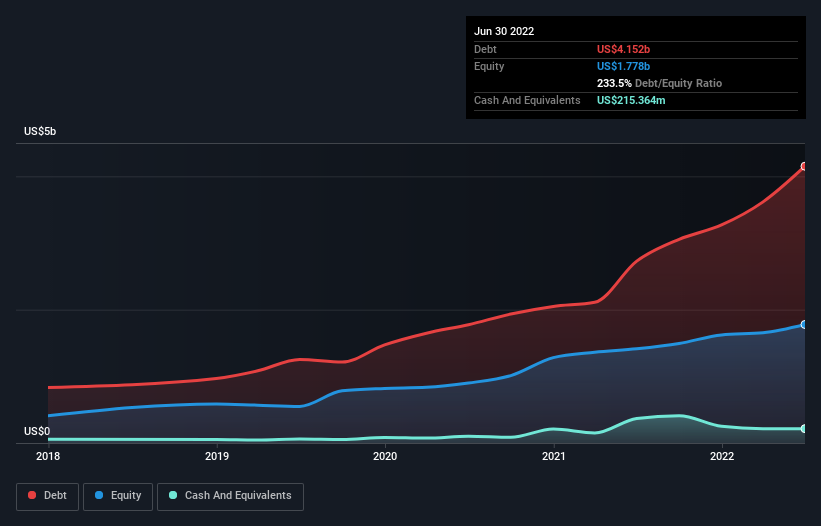- United States
- /
- Renewable Energy
- /
- NYSE:NOVA
Is Sunnova Energy International (NYSE:NOVA) A Risky Investment?

Legendary fund manager Li Lu (who Charlie Munger backed) once said, 'The biggest investment risk is not the volatility of prices, but whether you will suffer a permanent loss of capital.' So it seems the smart money knows that debt - which is usually involved in bankruptcies - is a very important factor, when you assess how risky a company is. We note that Sunnova Energy International Inc. (NYSE:NOVA) does have debt on its balance sheet. But the more important question is: how much risk is that debt creating?
When Is Debt Dangerous?
Debt is a tool to help businesses grow, but if a business is incapable of paying off its lenders, then it exists at their mercy. If things get really bad, the lenders can take control of the business. However, a more frequent (but still costly) occurrence is where a company must issue shares at bargain-basement prices, permanently diluting shareholders, just to shore up its balance sheet. Of course, the upside of debt is that it often represents cheap capital, especially when it replaces dilution in a company with the ability to reinvest at high rates of return. When we think about a company's use of debt, we first look at cash and debt together.
Check out our latest analysis for Sunnova Energy International
What Is Sunnova Energy International's Net Debt?
The image below, which you can click on for greater detail, shows that at June 2022 Sunnova Energy International had debt of US$4.15b, up from US$2.73b in one year. However, because it has a cash reserve of US$215.4m, its net debt is less, at about US$3.94b.

How Strong Is Sunnova Energy International's Balance Sheet?
The latest balance sheet data shows that Sunnova Energy International had liabilities of US$387.7m due within a year, and liabilities of US$4.52b falling due after that. On the other hand, it had cash of US$215.4m and US$227.7m worth of receivables due within a year. So it has liabilities totalling US$4.47b more than its cash and near-term receivables, combined.
The deficiency here weighs heavily on the US$2.53b company itself, as if a child were struggling under the weight of an enormous back-pack full of books, his sports gear, and a trumpet. So we'd watch its balance sheet closely, without a doubt. After all, Sunnova Energy International would likely require a major re-capitalisation if it had to pay its creditors today. When analysing debt levels, the balance sheet is the obvious place to start. But it is future earnings, more than anything, that will determine Sunnova Energy International's ability to maintain a healthy balance sheet going forward. So if you're focused on the future you can check out this free report showing analyst profit forecasts.
In the last year Sunnova Energy International wasn't profitable at an EBIT level, but managed to grow its revenue by 77%, to US$347m. With any luck the company will be able to grow its way to profitability.
Caveat Emptor
Even though Sunnova Energy International managed to grow its top line quite deftly, the cold hard truth is that it is losing money on the EBIT line. Indeed, it lost US$49m at the EBIT level. Considering that alongside the liabilities mentioned above make us nervous about the company. We'd want to see some strong near-term improvements before getting too interested in the stock. Not least because it burned through US$960m in negative free cash flow over the last year. So suffice it to say we consider the stock to be risky. There's no doubt that we learn most about debt from the balance sheet. But ultimately, every company can contain risks that exist outside of the balance sheet. For example, we've discovered 5 warning signs for Sunnova Energy International (1 is potentially serious!) that you should be aware of before investing here.
When all is said and done, sometimes its easier to focus on companies that don't even need debt. Readers can access a list of growth stocks with zero net debt 100% free, right now.
New: Manage All Your Stock Portfolios in One Place
We've created the ultimate portfolio companion for stock investors, and it's free.
• Connect an unlimited number of Portfolios and see your total in one currency
• Be alerted to new Warning Signs or Risks via email or mobile
• Track the Fair Value of your stocks
Have feedback on this article? Concerned about the content? Get in touch with us directly. Alternatively, email editorial-team (at) simplywallst.com.
This article by Simply Wall St is general in nature. We provide commentary based on historical data and analyst forecasts only using an unbiased methodology and our articles are not intended to be financial advice. It does not constitute a recommendation to buy or sell any stock, and does not take account of your objectives, or your financial situation. We aim to bring you long-term focused analysis driven by fundamental data. Note that our analysis may not factor in the latest price-sensitive company announcements or qualitative material. Simply Wall St has no position in any stocks mentioned.
About NYSE:NOVA
Sunnova Energy International
Provides solar energy services in the United States.
Slight and fair value.


